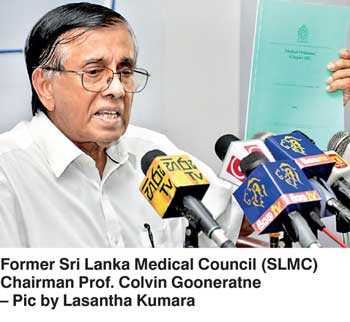Monday Feb 23, 2026
Monday Feb 23, 2026
Saturday, 4 August 2018 00:12 - - {{hitsCtrl.values.hits}}
 By Ruwandi Gamage
By Ruwandi Gamage
Former Sri Lanka Medical Council (SLMC) Chairman Prof. Colvin Gooneratne yesterday called for sweeping legal reforms to protect patients against doctors committing malpractice, insisting existing regulations fail to hold doctors accountable as they are dominated by the medical practitioners themselves.
Prof. Goonaratne, speaking to reporters after stepping down as SLMC Chairman following a controversial nine-month stint, highlighted major administrative problems in the SLMC Constitution. He noted that the present legal structure under the Medical Ordinance Section 105 prevents the Council from making independent decisions regarding complaints of doctors who have made professional blunders in treating patients.
He noted that, even though patients could submit complaints of malpractice to the SLMC, they were heard by a Court of Inquiry only comprised of Council members. This process prohibits independent evaluation of the complaints, and the unprofessional conduct of doctors is often overlooked.
“The purpose of this Constitution must be to provide for the welfare of the general public. But as things are now, this process protects doctors, not the innocent civilians. The primary objective of safeguarding the public cannot be achieved through this Act,” he said.
As stated in the Constitution, the governing body of the SLMC, comprised of 25 members, inclusive of the Chairman, is appointed in line with the Medical Ordinance. These members are selected by holding an election, where each registered doctor gets one vote. However, in practice, two-thirds of the members in the board are from the Government Medical Officers’ Association (GMOA) and the Faculty of Medical Teachers’ Association (FMTA), both of which are powerful trade unions with thousands of members.
Prof. Goonaratne went on to detail how dozens of doctors were bussed in from around the country to vote in the last elections so that candidates preferred by the unions would be elected.
“Out of the 25 members, eight are leaders of the GMOA, while another eight are leaders of the FMTA. While the former is a powerful trade union, the latter is a trade union of university deans. The main objective of a trade union is to protect their members. However, this clashes with the purpose of a medical council, which is to protect the rights of the public. How is this justified?” said Prof. Goonaratne.
According to the former Chairman, the SLMC has the authority to call upon the Court of Inquiry to handle complaints and grievances received by the general public against malpractices of doctors. These complaints and grievances are being processed by two special committees, which then will be forwarded to the Court of Inquiry.
“The Court of Inquiry is composed of judges, prosecutors and a jury, all of which will be members of the SLMC. And they have to pass the verdict of a doctor against an innocent civilian who has faced injustice. This is not what the Council stands for. During my five years as a member of the Council and nine months as Chairman, the Council has yet to find a doctor guilty. We used to receive at least three complaints each month.”
Prof. Goonaratne remarked how this issue is not a new one and countries like Canada, Australia and Britain have taken measures to solve this issue to provide justice to the general public. He then compared in detail the Council’s 30-year Constitution alongside the British General Medical Council (GMC) to showcase the progressive practices of Britain.
“The GMC’ s governing body of 12 members, inclusive of six doctors and six non-doctors, such as lawyers, engineers and consultants, are appointed by a special commission whose sole function is only to choose the members of this body. This special commission is assigned by something called the Privy Council, the court holding higher authority than the Supreme Court. The administration appointed by the GMC to handle complaints and grievances of the public, which is called the Medical Practitioners Tribunal Service (MPTS), is similar to that of the Court of Inquiry in Sri Lanka, and even this is comprised of laymen,” he said.
The former Chairman further provided justification for changing the existing regulations by pointing out examples from research conducted by attorney-at-law Avanthi Perera, which studied 60 cases of medical malpractice in Sri Lanka. The research was done by her for her Ph.D.at the University of Cambridge and is titled ‘Medical negligence in Sri Lanka’.
Prof. Goonaratne stated that none of those interviewed felt that had been given justice by the SLMC Court.